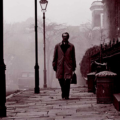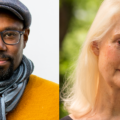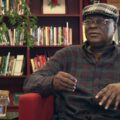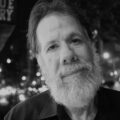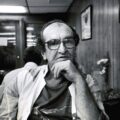Conversations: Kirsten Greenidge and Melinda Lopez

Kirsten Greenidge is the Village Voice/Obie award-winning author of Milk Like Sugar and The Luck of the Irish, as well as the plays Little Row Boat; or, Conjecture, Our Duaghters, Like Pillars, and others.
Greenidge is a PEN America/Laura Pels Award recipient, a former NEA resident playwright at Woolly Mammoth, a two-time TCG/Edgerton New American Play Award recipient, a Sundance/Time Warner Award recipient, a Kennedy Center/American College Theatre Festival Mark David Cohen Award winner, and a Kennedy Center/American College Theatre Festival Lorraine Hansberry Award winner. An alumnus of New Dramatists, she is currently a Huntington Playwrighting Fellow and a Mellon Foundation/Howlround artist-in-residence at Company One Theatre, both located in Boston. She is meanwhile working with several theaters on commissioned projects.
Using a pronounced, hyper-realistic style and detailed attention to poetic language, Greenidge’s plays examine the intersections of race, gender, and class. She began writing at a very early age and attended the playwright’s workshop at the University of Iowa, where she experienced the freedom and exhilaration of a playwright’s workshop—a creative space where writers are encouraged to take risks and hear their work read aloud again and again—and where writers are taught to be constructive listeners to and supporters of each other’s work. These are principles that guide Greenidge’s playwriting classes at the School of Theatre at Boston University, where Kirsten oversees the BFA Playwrighting Track of Study and New Works Festival.
Melinda Lopez, meanwhile, has a secret evil plan: to create complex, latina women and put them center stage.
Lopez is currently the artist-in-residence at the Huntington Theatre Company, following a six-year-term with the Mellon Foundation National New Play Residency. She is currently developing a series for Audible, titled Escoria. It is an immigration drama set in 2018 and in 1980 during the Mariel Boatlift.
Lopez’s work has been produced at the Huntington Theatre Company, Arts Emerson, The Guthrie Theatre, the Old Globe, Stepenwolf, and many others. Her recent work includes an adaptation of Yerma, Mala, (Elliot Norton Award winner for Best New Play; Arts Impulse Award winner for Best Solo) which is available to download on audible in both English and Spanish. Other recent works include Back the Night, Becoming Cuba, From Orchids to Octipi, and Gary.
Lopez is also an actress, having appeared on both stage and screen—her appearance in the film Fever Pitch has even become an internet meme. She currently teaches playwriting at Boston University and is active in providing humanitarian aid for the people of Cuba. And had the honor of being named by President Obama in a speech to the Cuban and American people in 2016. Mayor Marty Walsh also declared October 29, 2016, Melinda Lopez Day in the city of Boston.
She lives in Greater Boston’s metrowest region with her husband, daughter, a giant yellow dog, and other critters, and she occasionally sleeps on the ground in the American southwest. Lopez has run two marathons and plays a little ukulele.
Lopez and Greenidge began by discussing the power of place in their writing…
Melinda Lopez: I grew up in suburban Boston although my family roots are in Cuba (and I was born in Colombia). Still, most of my memories of school, friends, and Being are located in New England. I studied the American revolution at school, and learned about the Cuban revolution at home from my parents and family—through family stories. My dad was a great storyteller.
I have a few plays that I consider my suburban angst plays, like Gary, which is a rock musical (and perhaps my favorite of my own plays) and some others, mainly shorter plays. I love visiting the quintessential themes of the suburban kid at a loss for how to move forward, alienation and trying to make your mark. They show up a lot in pop culture.
I also love the long-standing relationships that get forged when you live in one place for a long time, and know that place deeply— even if it is a barren (culturally) place. And, I am a fool for the Dunkin parodies.
KG: Being from New England, I could listen to a bit in a play about Dunkies go on and on…
ML: I tend to write more about Cuba though. Maybe that is how my imagination works? There is something about the difference in the languages that ignites my creative side. Or maybe I fear that in exposing my “Bedford roots,” I’m just too vulnerable? Hmm. I should look at that.
KG: I too grew up in the suburbs, and also married a suburban boy, so to speak. In a way I think I had always been fascinated by that ilk of being–such perceived ease in the world, compared to the way I experienced it growing up in Arlington, even though I genuinely really loved many things about my childhood and growing up there.
ML: I love that—“perceived ease.” I feel like most of my life is moving from one disguise to another. And always expecting getting outed—“now I’m the girl from New England,” “now I’m the immigrant from economic privilege,” “now I’m the person of color in a room full of white people and I need to Represent,” “now I’m the ‘authority on playwriting’ in front of students with more talent and more ambition than me…”)
And everything/everyone you are tied to informs who you are now. You didn’t choose them but you are bound to them. It’s all about family. Who said, “‘family is all there is to write about”? I think I’m paraphrasing Sam Shepard. I agree. There is nothing else.
KG: Lately, I have been thinking a lot about culture, and this area of the country, and the relationship between the two. I am struck by your Shepard quote about family being all there is to write about, mostly because I think of my family as being from New England, even though my grandfather was from Virginia, and my father’s family is from Barbados.
When people ask where I am from, I tell them “Boston.” And they say, “no, really.” And eventually I say what my youngest sister has grown to say: “we are black people From New England. That means we eat pot roast and we LIKE IT.” And we do.
I think certain aspects of life in the northern United States have seeped into my writing. New England, particularly Boston, is layered in history, haunted by the misdeeds of those who have come before, and my writing often deals with ghosts and present generations working through what previous iterations of people have left behind: legacy and cultural residue.
ML: SO MANY GHOSTS—in your work and in mine.
KG: I think that’s what the townie boys do not always think they need to worry about, that always made them so enigmatic.
ML: 🙂
KG: But of course, we are all wading through it, even when we don’t see it. I remember once such boy, all grown up, at a weekly dinner at our house when we still lived in West Medford, which historically has been one of Boston’s oldest suburban black neighborhoods, turning to me all of a sudden and saying—because he is also a very sensitive soul—“this entire area is just soaked in blood”—in reference to the land having been taken from indigenous people, and then also once having been so close to a plantation. So, really, none of us are free.
I’d love to know what role literature plays in your work. Right now I have no idea in terms of my own work, but that is mostly because I am at a crossroads in terms of what I am able to read as I also write and teach, and generally run about like a chicken with its head cut off. But yes, what do you turn to to work from?
ML: Literature sounds so luxurious! Because I teach plays to undergrads—as well as playwriting to graduate students—I am constantly rereading August Wilson and Paul Vogel—two playwrights that continually inspire me. I also love non-fiction when I am reading for pleasure—I just love knowing how things work—science, political systems, the universe. I am drawn more and more to plays with non-traditional structures and non linear stories (August Wilson aside) and I have been—“consoled” I guess is the word I am looking for—that there are so many ways to tell a story onstage.
Of course there is always Marquez and the poems of Sandra Cisneros and Mary Oliver and Rumi and Walcott… hmm… a lot of poets there.
KG: I also am tending to turn to impossibly large things, possibly to punish myself, which is perhaps unhealthy. So right now it is Anna Karenina, because why not? And the answer is: I have been unable to stop long enough to research this book to figure out, why now? Why again? I need to do it soon though.
ML: Oh I can’t wait to see what you create!
KG: As for family, I am writing about my family now, and I am faced with the challenge of needing to really delve deeper into the play. Time is not on my side. It so often comes down to needing to claim time to work. I think of O’Neill writing Long Day’s Journey and weeping and placing everything, his entire being onto the page, and right now, that is what this play requires, and that is not what is happening. It does not require me telling my family’s secrets, it does require telling truths, but to do that, I need time to excavate them, and time—hours and days of it—is just not my own.
ML: This makes me think of seeing Ruined at the Huntington. I saw the production before reading the play and it left me eviscerated. When I went to read the script, I couldn’t believe how skinny the play was—so spare, so direct and clear, whereas the production felt monumental. Epic. Like it must have been a 300-page play—but it wasn’t.
Which makes me think that actors and directors bring everything you need. Sometimes being in the room with the actors gives you what you need. Do you find that to be true? I often feel like I give them way too many words—that it’s me looking for the play. I wonder how many drafts Lynn Nottage wrote.
KG: How does anyone find the time? I literally sit in my car asking this out loud to myself. And I have no answers.
ML: Ahh. Yes. Just yesterday I was slumped at the kitchen table, near tears, trying to figure out how I could get back to my play. So many things in the way. And the head space just doesn’t recover. I always think I can schedule writing like its a trip to the dentist—here’s a 90-minute slot where I can fit that in. But of course it doesn’t work like that. I need time to sit and sink into a world and mental space that isn’t full of other people’s plays.
It feels like I have to surround this excavation with layers and layers of protection—like bubble wrap it to death—with TIME. Sometimes I write in my calendar SAY NO on days that look like promising writing days (usually a month in advance).
But I don’t know how you do what you do. You produce more great plays—and mentor more students—with real generosity—than any living writer (well I made up that statistic, but it seems true). I just can’t think of another writer that does what you do. How do you do it?
KG: I love the action of writing “Just say NO” on certain calendar days. I will need to ink those into my calendar before the year begins so that I do not end up in a tangle. As for the “how” of schedule and writing, lately I do not feel I am balancing it very well in that I really do need massive amounts of time to write better.
For a while I was able to segment my year in terms of researching and gathering materials during the academic year, and using breaks from the university calendar to generate work. As I get older I do not feel there is a great expanse of time to get the work done, or to enjoy my kids, or to learn new things, when I segment in this way, so I suppose one thing this year has taught me–seeing as it is New Year’s as I write this—is that I am in need of a shift in my relationship when it comes to my work and my life. I don’t think it’s quite the same as “work life balance,” but more like work life integration in ways that are healthy and fulfilling. Which sounds a bit like a New Age conference topic.
I am in complete and total awe of your literary expertise. There is so much to read and see.
In terms of actors and directors bringing more to a script: yes, yes they do. They bring so much. In the case of this piece, it is trusting this type of structure that I had abandoned for a bit. I often love to play with time and “jump about” so to speak, and in this, the piece does not quite call to be told that way, I find myself going back to more conventional forms I used decades ago. Has this happened to you? A bit of a need to retread as one moves forward, so to speak?
So I often find myself sitting there with the cast and director thinking “oh RIGHT! There was no consequence for this action, this is Playwriting 101. Ah!” The basics are hounding me. In delightful ways, because I realize, oh yes, these are the foundations for what we do as dramatists, but also in a humbling way of “oh, yes, I can create all the bells and whistles of language here, but action (through dialogue) is what is ultimately needed much of the time”.
It is interesting that you bring up the idea of being consoled and experiencing that in the theatre. What have really memorable experiences in the theatre created within you? Maybe I am thinking of this now because it is end of year/mid year and so rounds of those “Best Of” lists are circulating and I am often stymied in general by superlatives in art, but particularly when it comes to naming what a particular story told in a particular way does to a majority of people who see it. How can this happen? Is it the magic of theatre? The communal we find in seeing an authentic human experience? Or is it several deciding for the many, and a form of group-think, since feeling is so specific and individualized, and the description of it loses a bit of that in its need to generalize?
ML: I always start with Hamlet, which I saw in ninth grade and never got over. And seeing An Iliad last month—the power of the story, right? Like you said—you need words and bells and lights, but you also need stuff to happen. How I Learned to Drive, too, I recall watching the play and feeling like I knew exactly what the playwright was doing until I was UNDONE—and couldn’t leave my seat. Billy Porter’s Topdog/Underdog was sublime. So much brad and subtle, playful and cruel and smart and funny.
What did I get from ninth grade Hamlet?—well, I just wanted to be an actor. It created this hunger to get to feel all that stuff. And for sword fighting. I think my plays are feeling plays. They mostly tend to lead to a gut punch—at least that’s what I try to do. I think that’s from Hamlet.
In terms of critical response—the dreaded Top 10—I just don’t know. I have stopped using the terms “good” in class (at least I try to be very vigilant about using that word) because I don’t have any idea what “good” is. I know what works for me. But that’s a terrible way to teach. I try to circle the wagons around what I think the playwright is doing, and then see if it is successful. The work involves making the play “as much itself as possible.”
I guess that’s how I write, too (although I’m allowed to judge my own work as“good” or “bad”). And even then, it’s hopeless to try and make something “good.” And so with critics—I don’t know.
Playwrights understand everything is always in the “process” phase. We are never done. Are you ever done?

